Democracy without Associations
Interests, Identities, and Institutions in Comparative Politics
Series Editor:
Mark I. Lichbach, University of California, Riverside
Editorial Advisory Board:
Barbara Geddes, University of California, Los Angeles
James C. Scott, Yale University
Sven Steinmo, University of Colorado
Kathleen Thelen, Northwestern University
Alan Zuckerman, Brown University
______
The post-Cold War world faces a series of defining global challenges: virulent forms of conflict, the resurgence of the market as the basis for economic organization, and the construction of democratic institutions.
The books in this series take advantage of the rich development of different approaches to comparative politics in order to offer new perspectives on these problems. The books explore the emerging theoretical and methodological synergisms and controversies about social conflict, political economy, and institutional development.
______
Democracy without Associations: Transformation of the Party System and Social Cleavages in India, by Pradeep K. Chhibber
Gendering Politics: Women in Israel, by Hanna Herzog
Origins of Liberal Dominance: State, Church, and Party in Nineteenth-Century Europe, by Andrew C. Gould
The Deadlock of Democracy in Brazil, by Barry Ames
Political Science Solving, edited by Bernard Grofman
Institutions and Innovation: Voters, Parties, and Interest Groups in the Consolidation of DemocracyFrance and Germany, 1870-1939, by Marcus Kreuzer
Altering Party Systems: Strategic Behavior and the Emergence of New Political Parties in Western Democracies, by Simon Hug
Democracy without Associations
_____
Transformation of the Party System and Social Cleavages in India
Pradeep K. Chhibber
Ann Arbor
T HE U NIVERSITY OF M ICHIGAN P RESS
First paperback edition 2001
Copyright by the University of Michigan 1999
All rights reserved
Published in the United States of America by
The University of Michigan Press
Manufactured in the United States of America
 Printed on acid-free paper
Printed on acid-free paper
2004 2003 2002 2001 5 4 3 2
No part of this publication may be reproduced, stored in a retrieval system, or transmitted in any form or by any means, electronic, mechanical, or otherwise, without the written permission of the publisher.
A CIP catalog record for this book is available from the British Library.
Library of Congress Cataloging-in-Publication Data
Chhibber, Pradeep K., 1956
Democracy without associations : transformation of the party system and social cleavages in India / Pradeep K. Chhibber.
p. cm. (Interests, identities, and institutions in comparative politics)
Includes bibliographical references and index.
ISBN 0-472-10962-6 (cloth : acid-free paper)
1. Political partiesIndia. 2. IndiaPolitics and
government1977 I. Title. II. Series.
JQ298.A1 C48 1998
324.253ddc21
98-25511
CIP
ISBN 0-472-08827-0 (pbk. : alk. paper)
ISBN13 978-0-472-10962-3 (cloth)
ISBN13 978-0-472-08827-0 (paper)
ISBN13 978-0-472-02396-7 (electronic)
To my parents Kanta and Opinder Chhibber
Contents
Acknowledgments
This book is a small beginning in my attempt to understand why some social divisions are more salient than others. The particular angle this enterprise focuses on is the role that political parties can play in exacerbating some differences while muting others. The book also represents an effort to understand Indian party politics. As I developed an interest in party politics, especially the role of political parties in Indian politics, the question that intrigued me then and this book purports to provide some answer to is how similar and different are Indian parties from parties in other parts of the world? Indian political parties look different only because some institutional conditions, the role and structure of the state and the nature of social relations, constrain an Indian politician.
John Petrocik and Richard Sisson share the credit for sustaining and encouraging my interest in political parties and Indian politics. The project was brought to fruition by a number of people. In India, an unusual assortment of individuals have helped sharpen my understanding of Indian politics and the debt to them is both intellectual and personal. Dr. G. V. S. Murthy taught me about winning elections, staying in power, and retaining popularity. Preet Bedi showed me the importance of pragmatism, clear thinking, yet without losing sight of the passion for doing the right thing. Discussions with Shakti Sinha were always insightful and professional courtesies never intruded into the friendship. Rupak Vaish helped me better understand the shifting sands of right-wing politics while conversations with Anil Kapur stressed the significance of nationalism. Rajiv Chhibber introduced me to the politics of the street. Subhash Misra was always there as a friend and, sometimes, as a colleague. Subhash not only made operationalizing the surveys easier but he also never lost faith in me and provided consistent encouragement. His friendship has proved invaluable through this process.
In the academic community in Delhi the late Frank Thakurdas introduced me to Plato, Gian Singh Sandhu brought home the value of intellectual integrity, and M. P. Singh and Subrata Mukherjee were always supportive. In Ann Arbor, conversations with Samuel Eldersveld, especially his prodding and insightful criticisms, were more than immensely useful. Mark Brandon, Ann Lin, Bob Pahre, and Michael Ross read some chapters and gave very thoughtful suggestions and criticisms. Ravinder Bhavnani, David Backer, and Ken Kollman read the entire manuscript and provide keen insights for revision. This work is better for their efforts. Research assistance provided by Caroline Arnold, Shiela Malkani, and Dulcey Simpkins at key points proved invaluable. And finally, Doug Dion kept me honest while smelling the roses.
In addition to my colleagues at Michigan a number of other people read and commented on parts of the manuscript and their efforts were helpful. Felipe Aguero and Mariano Torcal made helpful remarks on the ideas as did Lori Gronich and Dennis Patterson, who read parts of it carefully. A final reading by Hans Blomkvist and P. Dasgupta helped sort out some of the remaining inconsistencies. Cherie Steele read the entire manuscript carefully and gave great suggestions for improving many parts of the book. This book is much improved because of her help and suggestions. Frieda read the entire manuscript many times and heard the ideas often enough. Her intellectual input was vital to this book.
I also gratefully acknowledge Cambridge University Press for permission to reproduce parts of Who Voted for the Bharatiya Janata Party? British Journal of Political Science 27:631-39 (October 1997), reprinted with the permission of Cambridge University Press; Sage Publications, for use of segments from Pradeep Chhibber and Mariano Torcal, Elite Strategy, Social Cleavages, and Party Systems in a New Democracy: Spain, Comparative Political Studies 30:27-54 (February 1997), copyright 1997, reprinted by permission of Sage Publications, Inc.; the University of Texas Press for permission to reproduce large parts of State Policy, Rent Seeking, and the Electoral Success of a Religious Party in Algeria,


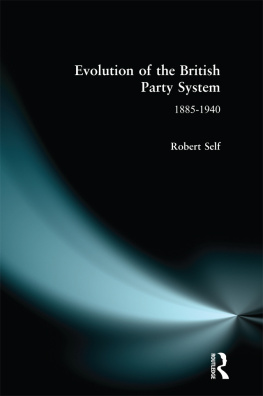
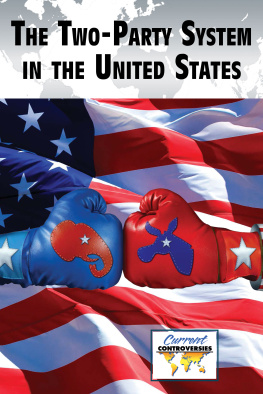
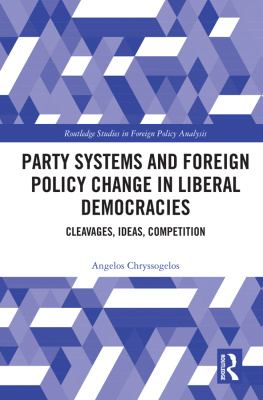

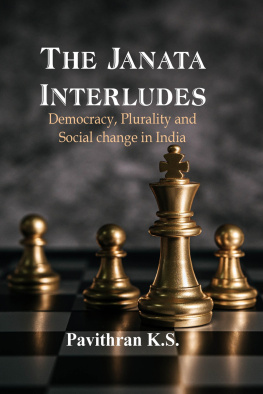
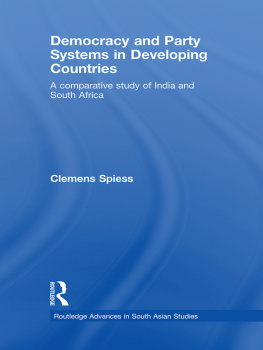
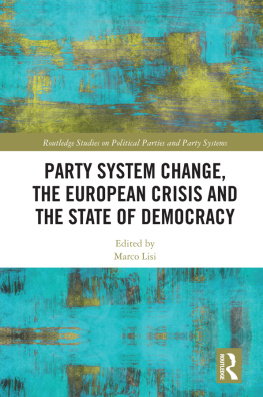
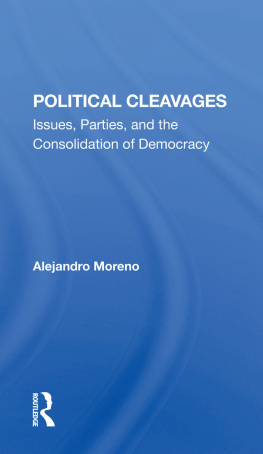
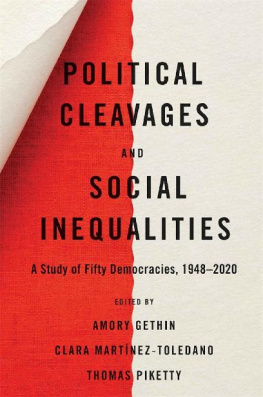
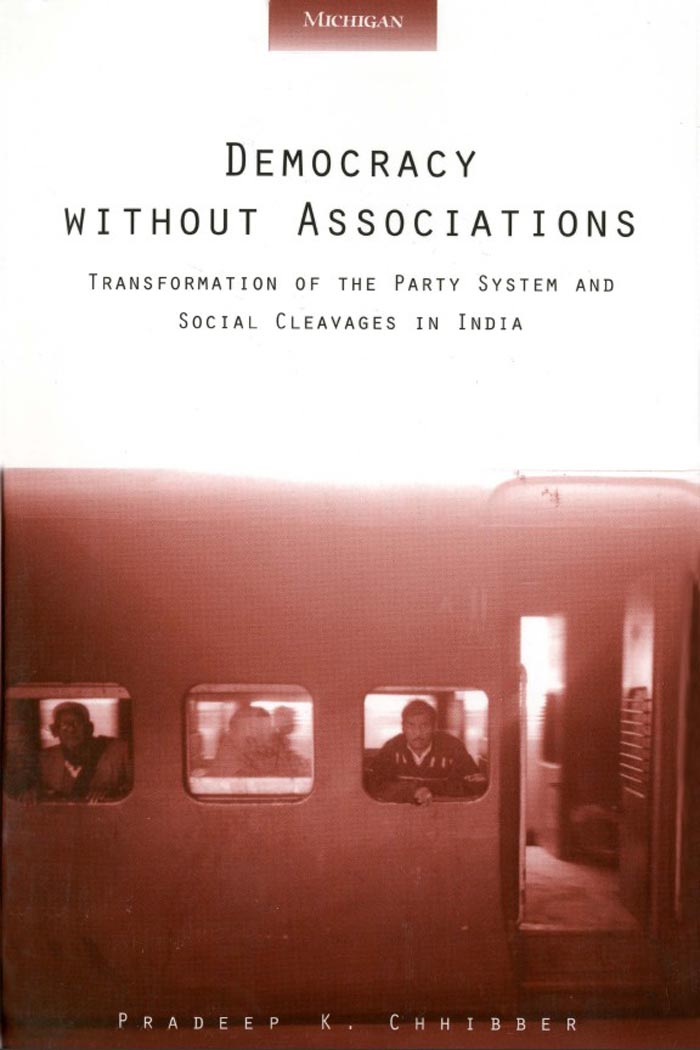
 Printed on acid-free paper
Printed on acid-free paper